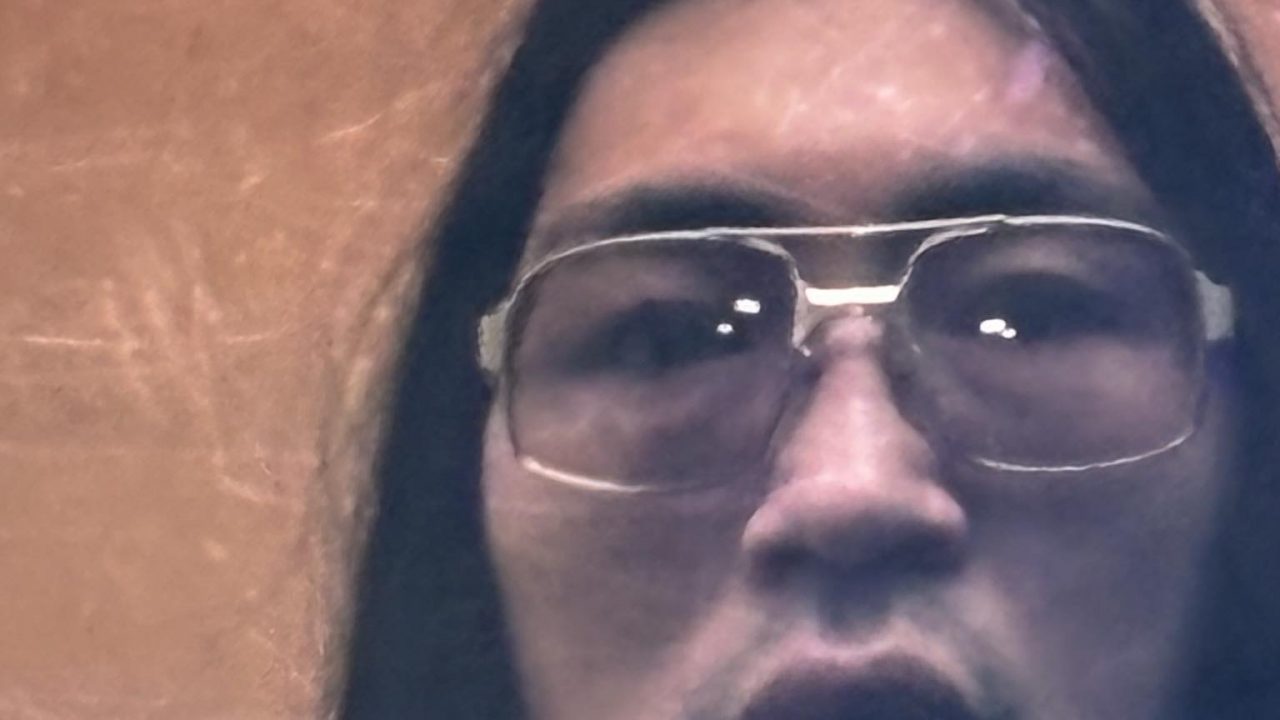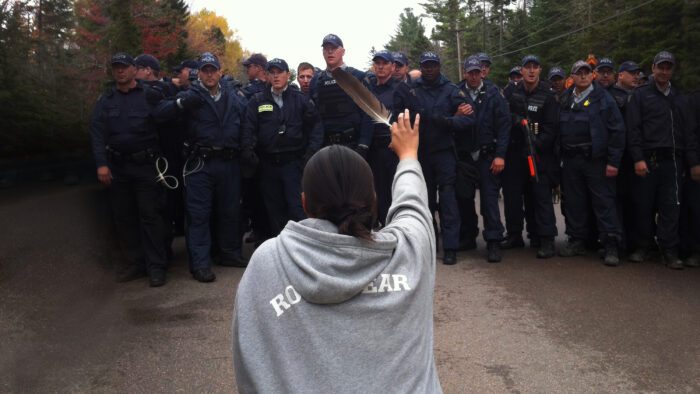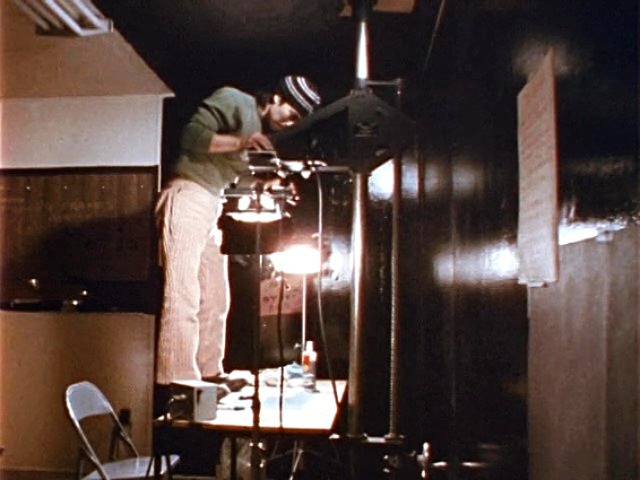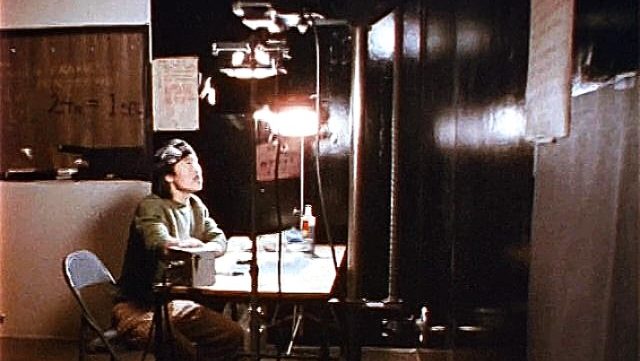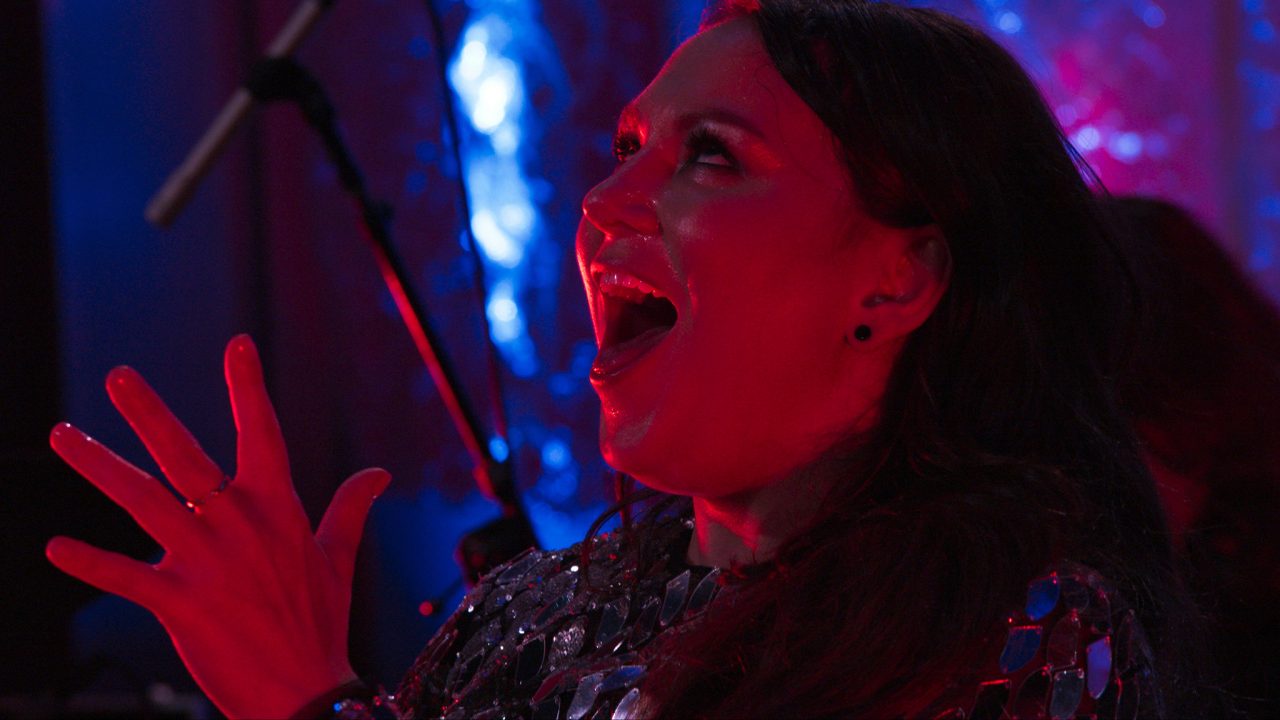
Ever Deadly: A Conversation with Tanya Tagaq and Chelsea McMullan
Ever Deadly: A Conversation with Tanya Tagaq and Chelsea McMullan
“You can smell the difference between smooth rock and jagged.” This is quintessential Tanya Tagaq—casually brilliant, sometimes playful, and effortlessly evocative to the point where almost every declaration and observation stops the listener in their tracks. It’s not so much a game of metaphor, lyric or poem, but rather another facet of Tagaq’s immutable, irrepressible artistry. Her creativity, her connection to the land, to nuna, is voracious and tender, embodied and whole, untameable and, as the film promises, ever deadly.
Tagaq’s co-director and collaborator, Chelsea McMullan, didn’t exactly know what they were in for when the two joined forces for Ever Deadly, which is ostensibly a documentary about Tagaq but also functions as a concert doc, and a love letter to Inuit culture. The film marks the first time the two ever worked together, but the friendship and collaborative relationship they built is part of what makes Ever Deadly such an innovative documentary. We spoke with Tagaq and McMullan about trust, breaking all the rules, and building something new together.
Andrea Warner: It’s an incredible choice to open up the film with this 10-minute-long close-up of intimate, beautiful throat singing between Tanya and Laakkuluk [Williamson Bathory]. Chelsea, can you tell me about trusting that scene and how you made that decision?
Chelsea McMullan: Tanya had told me that it was really important to her to shoot throat singing on the land, the way it’s traditionally done between two people. So I knew that was a priority and we wanted that to be a scene in the film. It was like one in the morning and that beautiful light, and we went and we did a few takes and it was a bit more formal. We were on a tripod and it was a wide shot of them, and it was really nice and we got some beautiful stuff. But then I think, Tanya, it was your mom who suggested we go to another location, and so we moved to this cliff where you could oversee everything. I asked our cinematographer, Alex, to go handheld and really get in there, get very intimate and feel closer to them. This was the first time they did it in the new location, and we didn’t shoot anything after that. I knew, even in that moment, that this would be one of the most beautiful things I ever would film in my entire life. And I knew it would either open or close the film, too. Sometimes it’s just magic… you’re watching next-level artists at the pinnacle of what they can do.
Tanya Tagaq: The reason I love that scene is because this is exactly where katajjaq [throat singing] comes from. Exactly. Like it’s born of the land, of the nuna, so exactly how it was always performed. I love opening the film with this example of our tradition. And then we can move forward to something a little more contemporary.
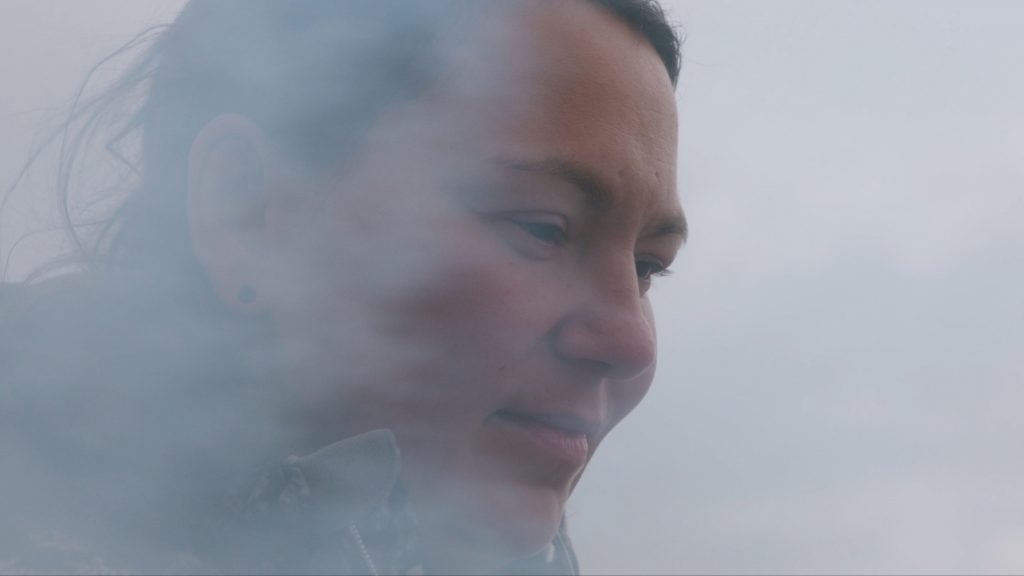
AW: Tanya, you’ve adapted throat singing as more of a solo practice. You’re not often face to face with someone. What’s it like for you to be in that moment and to be so close with someone and throat singing in this traditional way?
TT: When I look at it objectively, with my brain later, the connection, the intimacy, that we’re allowed to have—it is physical, but there’s a connection in the way you’re looking at each other and how you’re playing, and there’s just something so special about it. It’s okay to have this beautiful intimacy, even physically, and not have it be attached to sex. And if it is, that’s incredible. This freedom of expression and acceptance between each other—I love the intimacy of doing traditional throat singing, and it’s so fun watching people throat sing together, because you can see how their minds connect. You can see if their personalities gel, or if it’s even the tones of their voice. It’s like, okay, those two people probably won’t be best friends. Some people, wow, the connection is so intense, it’s just this sonic celebration of our connection. That’s what I find anyway, when I’m singing with somebody I truly love. It’s just white people that say it’s sexual, but I really think it’s an intimacy that goes deeper than sex.
AW: I don’t know if you’ve worked together before or if this was your first time, but the film feels like a real co-creation. How did you two build this collaborative language together?
TT: There’s some people where I don’t feel the need to hide myself. I never felt like I had to hide or pretend anything about who I was as a person with Chelsea. So we developed this beautiful trust; it was great to be open and joking, we play, the way we banter and how we support each other. You would push me here and there, but we would feel together what was right or what was wrong. I didn’t feel like I had to pretend to be nice [laughs]. I didn’t ever have to once be polite. And in fact, I was able to treat Chelsea like I do my family, where I just bug the shit out of them on purpose. It’s just a wonderful conduit for good art. And just thank you for giving me the room, Chelsea, because I’m so used to working with different demographics that don’t give you that. They want to harness you as their own thing, but you never did that. You didn’t do any kind of control garbage or any of that, you know, we just communicate like people should.
CM: I think you’re so right. We just are really able to communicate with each other.
TT: Nobody’s got that weird thing, there’s no power struggle, and there’s no competition. None of that annoying thing that can subliminally be at play. It’s a clear relationship of legit mutual respect, so I think that makes a good film.
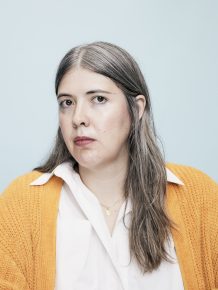
CM: I hadn’t really worked like this before. Film can be really hierarchical, and I am always sort of resisting that and dispelling that and was always kind of working towards that. Tanya really trusted me and I really trusted her, and everything was sort of based on trust. Not feeling guarded about anything, just hearing each other out and trying to figure out the best path forward. It was such an organic process. It was very liberating for me. I just learned so much from Tanya as an artist. The more I learned to let go and approach the film more intuitively, the better it got. That was the biggest thing I learned from Tanya. I thought I was trusting my instincts before, but Tanya is on another level.
AW: How have you moved into the next parts of your artistic life with what you’ve learned from each other? How has making Ever Deadly changed you?
TT: Oh, I’m just, like, horny to do another thing. I’m horny for cameras now. That’s the effect it had on me [laughs]. What about you, Chelsea?
CM: I’m really hopeful that Tanya and I will collaborate together again. But also I just think that Tanya should make films, because I just want to watch more films by Tanya.
AW: It’s wonderful to see how two people can collaborate, create something incredible, and be so loving and inspired by each other. Do you have anything else you want to make sure the NFB audience knows about Ever Deadly?
TT: I would have probably extended the conversation with my mother. Maybe next time we can go to where she was born. That story in itself is so important to underline. Since I’ve moved to Toronto, I’ve understood this thing now, where even if you’re speaking English, the words mean totally different things depending on which culture you come from. My mom and Inuit people tend to really downplay the things they go through. It’s very direct conversation, no embellishments. The lack of embellishment, when it’s witnessed or taken in by qallunaat culture, sorry, Southern white culture, it’s seen as, ‘Oh, it can’t be that bad, they’re not going on and on about it,’ or, ‘They’re not showing it in their face.’ And ‘It’s not that bad because here I am crying about my fucking latte.’ So, with my mom, I think it was very, very special. I had a conversation with her the other day, about her 12 years growing up, and she said, they didn’t even know how to be bad, because there was so much to do. There were 11 kids in the end, 13 but two died, and the parents would just say, ‘Do this,’ and they go, ‘Okay.’ And she said her parents didn’t argue in front of them. They had their quarrels, privately, and I giggled about that. Like, where did they go?
Anyway, I just like talking to my mom and I realized that she’s in the world, the planet, and the colonization and everything that’s happened, she herself had one of the most beautiful childhoods I ever heard of in my life. And when you understand the nuna, you understand the peace and the compromise that comes from within us, the generosity, the community, how we communicate towards each other, how we cherish each other, and how we stand up for ourselves. All those things are completely almost the opposite compared to living in upper-middle-class white Toronto. It’s just a completely different way of being, and so I get frustrated because when I hear my mother or when I hear Inuit say something that happened to them, that should be taken very, very seriously. But because of how it translates down here, we’re just not whining enough.
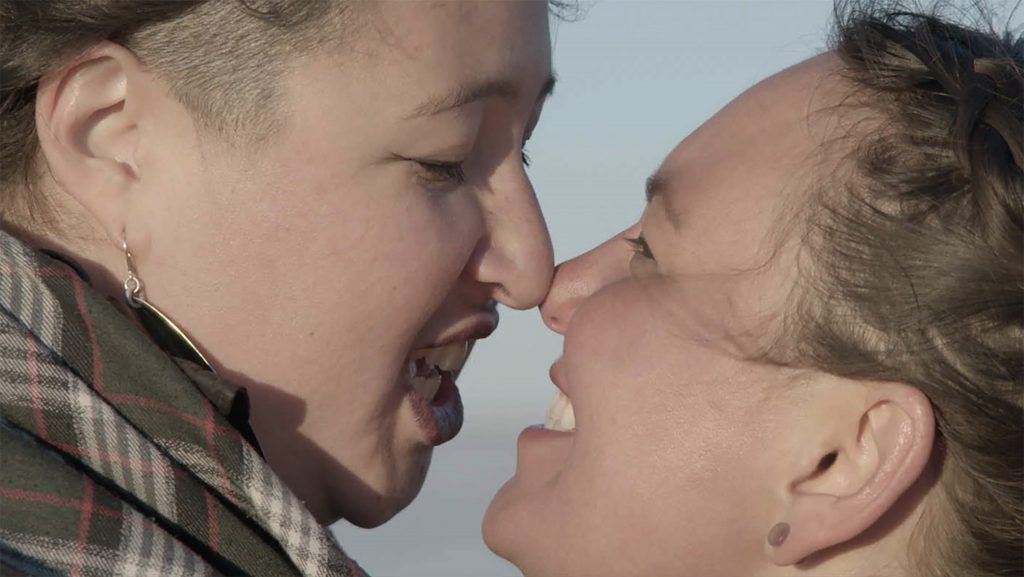
CM: Yeah. The scene with your mom, that’s definitely one of my favourite scenes, but I also knew how much it meant to both of you. I remember sending it to you and being so nervous. It was the scene I was the most nervous about and you were so sweet about it.
TT: I cried because of seeing the actual footage of [the forced relocation] happening. I was shocked. I didn’t even know that footage exists. It was my family, and it just hit me. My mom had said that before, but something about the visual, seeing the ships in the ice, knowing my grandmother gave birth on one of those ships, my mother talking about the plank between the two. It took them a month to go all the way north to live in a very, very, very purposefully awful environment, so the government could have money. It’s something I grapple with every day, and it’s the same feeling like, how come you don’t change the gun laws in America? How could you sacrifice people for this? For this cause you have that only makes sense in this southern world?
And I mean, I go back to my mom’s upbringing. This really, really sweet story, and then I’ll stop oversharing. My mom loves Christmas. Loves Christmas. I love Christmas. And our whole family loves Christmas—well, except my dad, he’s a grump. But never mind, he secretly loves it. I asked my mum one time, why, why she gets such beautiful, thoughtful things and why it’s such a celebration. And she told me this beautiful information. Her father, she realized when she got older, she wouldn’t see him in November. Because in the harshest of months, he would go out all day, every day, hunting, hunting, hunting, hunting, hunting, so he could trade the pelts for special food and gifts for his kids on Christmas Day. And just hearing her talk about when she got her first orange. My grandfather taking such effort and care to make sure all the kids felt special on Christmas, and the giving. It’s really interesting because it’s this Christian shittiness, but I believe this in many forms—my grandmother, when she read the Bible, even though it was not good that everyone was forced into Christianity, it’s the way she did it. The way she loved God and loved us. That felt pure. I don’t know. This intermingling of the Christian culture with Inuit traditions and sensibilities—I find that quite endearing.
Ever Deadly is co-directed by Tanya Tagaq and Chelsea McMullan and had its world premiere at the 2022 Toronto International Film Festival. It is now available on nfb.ca and on select digital platforms nationwide.
Andrea Warner (she/her) writes and talks. A lot. She’s the author of Buffy Sainte-Marie: The Authorized Biography and co-wrote and associate produced the 2022 documentary Buffy Sainte-Marie: Carry It On. Andrea is a settler who was born and raised in Vancouver on the unceded traditional territories of the Musqueam, Squamish and Tsleil-Waututh First Nations.
